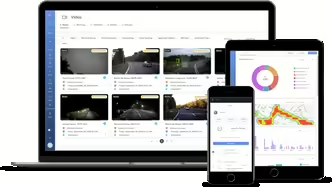Telematics systems have revolutionized fleet management by providing real-time data on vehicle location, speed, fuel consumption, and driver behavior. This data is invaluable for reducing operational costs, improving safety, and ensuring compliance with regulatory standards. However, the true potential of telematics is unleashed when it is integrated with other business systems, creating a unified ecosystem that enhances efficiency, productivity, and customer satisfaction.
Integrating Telematics with ERP, CRM and other business Systems
Enterprise Resource Planning (ERP) systems are the backbone of many organizations, providing a centralized platform for managing various business processes, including finance, procurement, inventory, and human resources. Integrating telematics with an ERP system can transform how businesses manage their resources, leading to:
- Enhanced Resource Management: By integrating vehicle data with ERP systems, businesses can gain real-time insights into the status of their assets. This allows for more accurate inventory management, better scheduling of maintenance, and improved allocation of resources.
- Cost Optimization: Combining telematics data with ERP financial modules provides a comprehensive view of operational costs. Businesses can track fuel consumption, and monitor maintenance expenses to reduce costs. This data-driven approach enables more informed budgeting and cost management.
- Streamlined Operations: Integration ensures that all departments within an organization have access to the same data. For instance, the finance team can use telematics data to reconcile expenses, while the logistics team can optimize routes based on real-time traffic conditions. This eliminates silos and enhances cross-departmental collaboration.
Integrating Telematics with CRM Systems
Customer Relationship Management (CRM) systems are essential for managing customer interactions, sales processes, and marketing campaigns. When telematics is integrated with CRM systems, businesses can unlock new opportunities for improving customer service and driving sales:
- Improved Customer Service: By linking telematics data with CRM, businesses can provide customers with real-time updates on delivery times, shipment status, and vehicle locations. This level of transparency builds trust and enhances the customer experience.
- Personalized Marketing: Telematics data can provide insights into customer behavior and preferences, which can be used to tailor marketing campaigns. For example, businesses can use data on delivery times and locations to offer personalized promotions to customers in specific regions.
Data Integration: The Backbone of Decision-Making
One of the most significant advantages of integrating telematics with ERP, CRM, and other systems is the ability to consolidate data from multiple sources into a single, unified platform. This integration provides businesses with a comprehensive view of their operations, enabling:
- Better Decision-Making: With access to real-time data from telematics, ERP, and CRM systems, business leaders can make more informed decisions. Whether it’s optimizing routes, managing inventory, or planning marketing campaigns, integrated data allows for a more strategic approach.
- Compliance and Reporting: Integration simplifies the process of generating reports and ensuring compliance with industry regulations. Businesses can easily track and document vehicle usage, maintenance, and driver behavior, reducing the risk of non-compliance and potential fines.
Conclusion: Driving Success with WhiteLabel Tracking
WhiteLabel Tracking’s platform offers a seamless integration with ERP, CRM, and other systems, providing businesses with a powerful tool to enhance their operations. Whether it’s improving resource management, optimizing costs, enhancing customer service, or enabling data-driven decision-making, the integration of telematics with other business software is key to achieving operational excellence.
In today’s competitive landscape, businesses cannot afford to operate in silos. By integrating telematics with other systems, WhiteLabel Tracking helps businesses break down barriers, improve efficiency, and drive success.
WhiteLabel Tracking is a leading provider of telematics solutions designed to meet the needs of businesses across various industries. Our platform offers cutting-edge features, including real-time tracking, advanced analytics, and seamless integration with other systems. With WhiteLabel Tracking, businesses can optimize their operations, reduce costs, and enhance customer satisfaction. To learn more about integration with other business systems contact us and we’ll be delighted to get you started.


